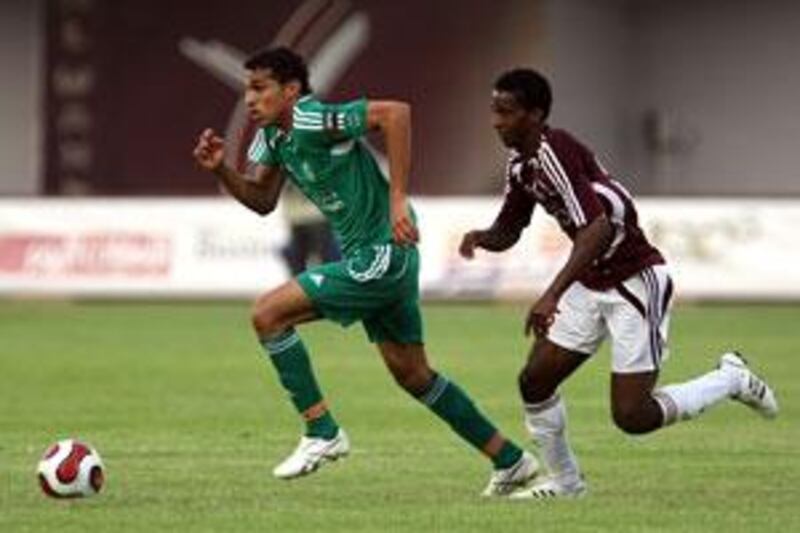The Etisalat cable television subsidiary, E-Vision, Tuesday launched the Middle East's first commercial high-definition television service in the UAE. Following the announcement, several broadcasters including Showtime Arabia, Orbit and Abu Dhabi TV, revealed plans to launch their own high-definition satellite broadcasts in coming months. It is a significant step for the country's high-definition and pay-TV markets, which have traditionally lagged years behind more developed markets, mainly because of the dominance of free-to-air satellite television. Until recently, broadcasters and content providers were in a stand-off over who would make the first major investment in the more expensive format, which provides a picture quality commonly described as four times better than standard definition. Humaid Sahoo, the chief executive of E-Vision, said it had been a challenge for the cable company to convince content providers to switch to high definition. "It was hard," Mr Sahoo said. "We were ready two and a half years back, but somebody just has to do it. So we said 'let's launch it'. High definition is the future of TV." E-Vision's high-definition cable service, which became available Tuesday, offers content from Abu Dhabi TV HD, Luxe HD, Fashion TV HD, Showtime HD and Al Jazeera Sports HD, with plans to add more content providers during the year. E-Vision customers, who make up 60 per cent of the UAE's pay-TV market, can upgrade to high definition for an extra Dh30 (US$8.16) a month, plus a one-time fee of Dh999 for the set-top box. "We would like to see 30 per cent of our E-Vision subscribers sign up," Mr Sahoo said. "That's our objective. It all depends on the content. If we have the content, it's achievable." As well as launching its Showtime HD channel through E-Vision Tuesday, Showtime announced that its Premier Cable customers can also upgrade to high definition for an extra Dh45 a month. It also announced plans to roll out a high-definition, direct-to-home satellite service by the end of the year. "HD broadcast requires a substantial investment on the part of both the broadcaster and the receiver," said Marc-Antoine d'Halluin, the chief executive of Showtime Arabia. "We are making progress in this regard and anticipate availability of our DTH [direct-to-home] subscriber base before the year end, with our new generation of DTH set-top boxes. "Our preparation meant that when approached by E-Vision, who have already developed their own HD cable boxes, we were able to produce a channel for the delivery of this proposition to our mutual customers." Orbit, one of Showtime's pay-TV competitors in the region, is also planning a high-definition option this year. "We cannot say which channels yet, but that's where we are so far," said Maria Khoury, the corporate communications director at Orbit. In developed markets like the US, which has more than 60 per cent of the world's high-definition viewers, the growth of high definition has been helped by their high percentage of pay-TV subscribers. Pay-TV currently reaches more than 80 per cent of the US population. But in the Middle East, the low penetration of pay-TV has meant that high-definition TV has been slow to enter the market. "Regionally, there's been a real stagnation on high definition over the last couple of years, while the US and Europe have forged ahead," said Nick Grande, the managing director of Channel Sculptor in Dubai. Abu Dhabi TV, the subsidiary of Abu Dhabi Media Company (ADMC) that operates several free-to-air satellite channels, also plans to launch its own high-definition service soon. The company has already acquired the extra transponder space to accommodate the larger bandwidth requirements of high definition, according to Edward Borgerding, the chief executive of ADMC, which also owns The National. "It's a chicken-and-egg situation," Mr Borgerding said. "People aren't going to buy the boxes and hook them up unless there is something to see, but you're not going to launch something until you can monetise it and there's someone watching it. "We made the decision to lead the market and create the content because we are sure people will come. It's a superior system and once you watch it, it's hard to go back. When people have a choice between high definition or not, 100 per cent are going to watch high definition." khagey@thenational.ae tgara@thenational.ae
E-Vision launches first HD TV in Emirates
E-Vision, the cable subsidiary of Etisalat, says high-definition television service will "redefine television experience" in the Middle East.

More from the national




